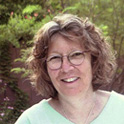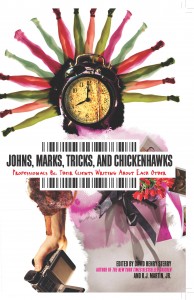We first met Gayle Shanks when we did an event at her bookstore Changing Hands in Tempe, Arizona. Never having been to Tempe, our expectations were low. Our expectations were blown out of the water. They packed the place. We were duly impressed. Turns out Gayle and Changing Hands have managed to make themselves an essential part of their community. They’ve got a phenomenal collection of books, amazing T-shirts and merchandise, and a wildly knowledgeable staff that absolutely loves books. They also bring in fantastic authors to do events, and really encourage self-publishers. So we thought we’d sit down and have a conversation with Gayle to see exactly how she has managed to keep her bookstore thriving, and in fact expanding at this moment in history when people keep trumpeting the death knell of the bookstore.

The Book Doctors: So, what prompted you to get into the ridiculous book business in the first place?
Gayle Shanks: When we started thinking about selling books it wasn’t a ridiculous business. Publishers and booksellers were thriving in 1974. There were dozens of independent stores in most cities and people were reading and and buying books. The chains, Borders and Barnes and Noble were smaller and named B. Dalton and Walden Books. They were mostly in shopping centers and didn’t seem to have a large impact on booksellers on Main Streets. Our stores for the most part were small, intimate spaces catering to our local communities and building readers from childhood through old age.
How has the book business changed since you first got into it?
Dramatically. In addition to the “B” chains expanding throughout the country and knocking out the local stores with their over zealous number of stores and retail selling space, Amazon joined the ranks in the 90s and changed the way the public thought about buying books. It’s not necessary to write about the impact Amazon has had but more interesting I think is the innovative ways that indie stores have struggled and evolved and managed to stay around in spite of the stiff and often unfair practices from the chains.
We keep hearing how bookstores are in terrible shape, but we’ve noticed that there are certain bookstores that are going gangbusters, and we would definitely put Changing Hands into that category. What do you do to keep your bookstore relevant and booming?
We change every day in small and large ways. We respond to trends, to our customers’ suggestions, to our employees ideas, to our community’s desires. We think outside the box and have made our store a destination, a Third Place for people to hang out, interact, bring their children, meet authors, have fun. We are an event producer and have over 400 events — large and small — each year inside and for really large events, outside our store. Our gift department with larger profit margins keeps books on our shelves longer and have helped create Changing Hands as a one-stop shopping experience for our customers. We provide gifts for all major holidays and birthday party presents for many, many children in our town. Books and gifts are a natural together and compliment one another. Our used books and remainders offer bargains for those who can’t afford full price new titles and the quality and quantity of them on our shelves offer people lots of choices and price points.
What mistakes do you see amateur writers making over and over again?
Oh so many mistakes — bad covers, not finding a good editor, writing a story that is great for their family but has no commercial appeal, bad writing in general, boring stories. And, an unwillingness or no knowledge of how to market the book once they have written it. It’s a very hard world for writers and self-published writers have an even harder time than those who can find agents and publishers to support them.
What things do you see professional writers do that help them become successful?
They learn to speak well in public. They are great social media people with followers on Twitter and Facebooks and they write great blogs. They interact with their readers and encourage them to share their books with their friends. They befriend their local bookseller and establish relationships with them that will carry over book after book. They make connections with key buyers at indie stores all over the country and cultivate those connections.
When you read a book, what attracts you and what repels you, in terms of putting it on your shelves?
Good writing and an interesting subject always attract me initially, but I have so many books to read that the arc of the story or good character development must happen quickly or I go on to something else. I am always looking for new authors and rely on my sales reps and fellow buyers to alert me to new books coming own the pike. I relish books by authors that I’ve read and loved and can’t wait for them to write another book. Sometimes I’m disappointed but usually not. I read about a book a week and 52 books isn’t that many to read in a year when there are so many published. I have to be somewhat selective but rarely go a day without starting something new. I have a book on CD in my car at all times and listen as I drive even though my commute is only about 10 minutes.
What you see as the future of books and publishing?
I think people are always going to read and I think the trend of reading on devices is going to be short-lived beyond those whose eyesight prohibits them from reading physical books. I think people are tired of staring at computer screens all day and will, after a few more years, not choose them as the way to read for pleasure. E-books will work for long trips to Europe when the weight of many books is too unwieldy for our suitcases but reading in bed and on the beach and on the couch, in my humble opinion, is best done with a book resting on my stomach or in my lap while I sit on a beach chair.
We understand you’re expanding, how did that come about?
A huge hole exists in our community now that most of the chains have left central Phoenix. Most of the indie stores were closed years ago because they weren’t supported by customers who became enthralled with Amazon and buying ‘cheaper’ at the chains. People have been begging us to open a Phoenix store for years now and the opportunity came up when a developer whose vision of a gathering place for the community centered on a bookstore asked us to partner with them on a project that will be truly exciting, innovative and creative. We are rehabbing an old adobe building and it will include our store, a great restaurant and a collaborative/flexible office space. We are planning a store that is smaller by half the size our current store and it will be carefully curated and include a wine and beer bar as well as a commons area where we can host events. The building is across the street from a light rail stop, will include lots of bike racks and we will encourage the urban shopper to
‘think green’ and shop locally.
What can writers do to connect with their local independent bookstore, and why should they?
Buy books at our stores — not on Amazon. Encourage their friends to do the same. Give readings at our stores. Converse with our customers. Suggest books to the buyers that they are reading and are excited about. Don’t stop talking about how important indie stores are to the community of readers and writers. Understand that without indie stores there will be no discovery of new authors, no support of mid-list writers, no venue for discussion and discourse. No young readers growing up attached to their booksellers and their books.
We hate to ask, but what advice do you have for writers?
Keep writing great books so those of us addicted to reading great books can look forward to the next great read. Stay true to your profession and study it. Learn from your mentors and favorite authors. Stay connected to the culture.
When Gayle Shanks isn’t not working in her garden, she is usually reading or watching reruns of West Wing and ER. She loves contemporary fiction, mysteries and memoirs. Occasionally you’ll find her reading essays by people like Malcolm Gladwell, Paco Underhill, Daniel Pink or John McPhee.
 This collection of personal essays by sex workers and their clients vacillates wildly from hilarious to depressing but never strays from being utterly captivating. Among the more amusing stories are a client with a “sweater fetish”, a woman who paid for her family’s Christmas presents by stepping on a man’s testicles in a pornographic film, and the dominatrix who got fired because she could not remove a client’s tooth. The phone sex operator asked to do cartoon animal voices for a caller is also not to be missed. Candid essays cover everything from the anonymous “captain of industry” with an appreciation for transsexual prostitutes, to the human misery of a pimp who turned out his own girlfriend. Some pieces are more meditative: Fiona Helmsey recalls meeting a kind client at a bachelor party who later died on 9/11, while Dr. Annie Sprinkle discusses her 40 years in the sex industry and her wish for “a more compassionate sex-positive society” in which “prostitutes and johns would be government-subsidized”. Though obviously not for the faint of heart, this book contains some courageous, raw, and intelligent writing that breaks taboos and smashes misconceptions. (Apr.)
This collection of personal essays by sex workers and their clients vacillates wildly from hilarious to depressing but never strays from being utterly captivating. Among the more amusing stories are a client with a “sweater fetish”, a woman who paid for her family’s Christmas presents by stepping on a man’s testicles in a pornographic film, and the dominatrix who got fired because she could not remove a client’s tooth. The phone sex operator asked to do cartoon animal voices for a caller is also not to be missed. Candid essays cover everything from the anonymous “captain of industry” with an appreciation for transsexual prostitutes, to the human misery of a pimp who turned out his own girlfriend. Some pieces are more meditative: Fiona Helmsey recalls meeting a kind client at a bachelor party who later died on 9/11, while Dr. Annie Sprinkle discusses her 40 years in the sex industry and her wish for “a more compassionate sex-positive society” in which “prostitutes and johns would be government-subsidized”. Though obviously not for the faint of heart, this book contains some courageous, raw, and intelligent writing that breaks taboos and smashes misconceptions. (Apr.)

